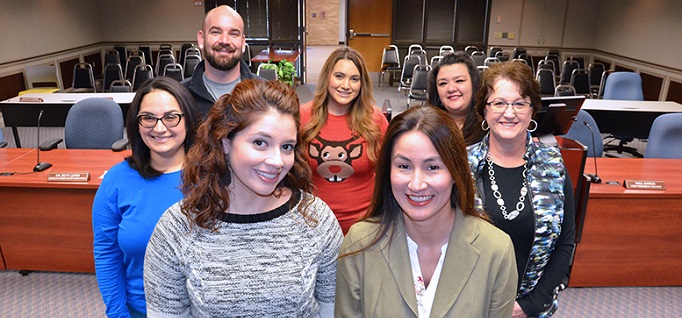Growing its own leaders
By Michael Bratten
January 2, 2019
A Texas college’s leadership academy addresses the impending void of qualified college leaders.
Rachel Benavides is getting a look behind the community college curtain. What she sees is an industry going through tectonic change.
“In the past, community colleges have been more enrollment-based than outcome-based,” said Benavides, director of Del Mar College’s adult education and literacy program and a member of its inaugural Next Generation Leadership Academy (NGLA). “Now, instead of looking at the front end, we’re looking at the back end and what we as a college have to do to help students get to completion. This is all fresh and new to me.”
The Texas college kicked off the NGLA this fall to nurture in-house talent and address an impending void of qualified college leaders. A partnership with Civitas Learning, the yearlong program puts 23 selected employees together in a room one day a month, where they learn about the issues facing colleges today and discuss how to drive change in the future.
Participants hear from nationally recognized higher education professionals such as Gerardo de los Santos and Mark Milliron, as well as Del Mar’s own leaders.
“It’s been noted that Gen Xers, myself included, are inclined to reach out, impart knowledge and pass on leadership opportunities to the next generation,” said Del mar President Mark Escamilla. “I’m proud to be a part of that.”
Besides theory-based curriculum and lunch-and-learn discussions, the program includes a fun component reminiscent of the “Shark Tank” TV show, in which NGLA participants must decide the best way to use an imaginary gift of $1 million from business tycoon Warren Buffett to benefit the college.
“They have to think outside the box about what would have a minimum cost and a big impact,” said Rito Silva, Del Mar vice president of student affairs and the NGLA facilitator. “At the same time, they’re creating leaders and forming relationships.”
Tapping internal knowledge
There is an element of urgency to the program. Widespread retirement of leaders in the next five to seven years is expected to create more vacancies than can be filled, Silva said. And most college leaders are so busy dealing with budget crunches, declining enrollment, government regulations and a changing political climate that worrying about who’s going to be a dean or president in the next few years is a luxury many they don’t have.
“That’s why these programs are important for the overall survival of the college,” Silva said.
Nationally, the community college sector sees some 250 turnovers annually among its presidents, according to the American Association of Community Colleges (AACC).
“It’s important to grow our own leaders,” Silva continued. “We could look externally, but there are certain things about internal candidates that are valuable…they have a history and they know the culture of the college.”
Del Mar’s goal with the NGLA program isn’t to indoctrinate employees into doing things in established ways, Escamilla said. It’s to create new ways of thinking by sharing information that previously was held close to the vest.
“Hanging on to the tricks of the trade is an outdated, selfish practice,” Escamilla said. “Sharing knowledge and skillsets is what makes us all better and more proficient in our jobs. This is key to embracing changes happening across the country in higher education.”
There’s more to the story! Read the full article in CC Daily.



